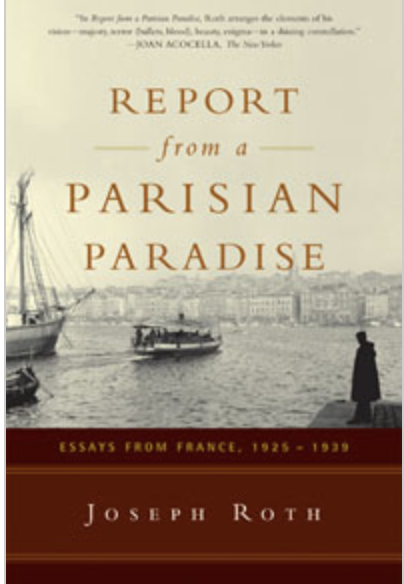Joseph Roth was born in what was then Ukraine in 1894. It took him 39 years to get to Paris -- he immigrated there from Germany in 1933 -- but once he did, he decided he'd found himself in, indeed, a paradise.
Roth is best known for his novel, Radetzky March (1932), though Americans may be more familiar with him through two collections of columns he filed for various newspapers: one, What I Saw: Reports from Berlin, 1920-1933, which details the Nazis' rise, which the prescient Roth feared from early on; and today's recommendation here, Report from a Parisian Paradise: Essays from France, 1925–1939.
Roth's translator, the indefatigable Michael Hoffman, has spent decades translating Roth's work. He describes these newspaper and magazines items as "a type of thoughtfully florid journalism that even in German goes by a French name: feuilletons (little leaves, or little sheets), for which Roth's own understated definition was 'saying true things on half a page.'"
In the book's title essay -- which is about a basement bar named Paradise -- Roth can hardly get into the club without being distracted by its neon sign, which is a blue
close to violet. It's the blue of blue pansies, and of the first morning mist to wreathe itself over a plowed field. It's the blue of vivid dreams and of cigarette smoke. It's not the blue of heaven or of the Mediterranean. You see how hard it is to describe a color.
Very sly, very Roth: you see how hard it is, but then again, he's done it very well.
The book is not all flights of fancy. Eventually the Nazis that Roth fled in German come to advance on France. Anti-semitism simmers. Roth's longtime consolation, alcohol, begins to destroy him (it would eventually kill him, just days before the Nazis arrived in Paris).
You can't judge a book by its cover, but the title here is telling: "Notes on a Parisian Paradise" is the title of the English edition. The German edition takes the name of another, late-life piece that Roth published in 1938, just six months before his death: "In The Bistro After Midnight." Equally poetic as the American title, and set in yet another bar, except this time all is darkness and dismay; the piece is largely a transcript of the sad musings of the crowd hanging on until closing time at the neighborhood bar. At one point, one of the men shouts, "No more conscience in the world!" Roth observes
...everyone laughed. They thought heh'd had a few--and he had. Anyway, it's typical of people today that when they're drunk and they hear the truth and they recognize it, still they try to tell themselves it's only the wild talk of someone drunk like themselves.
But it wasn't wild talk. The piece was published on November 11, during Kristallnacht.

